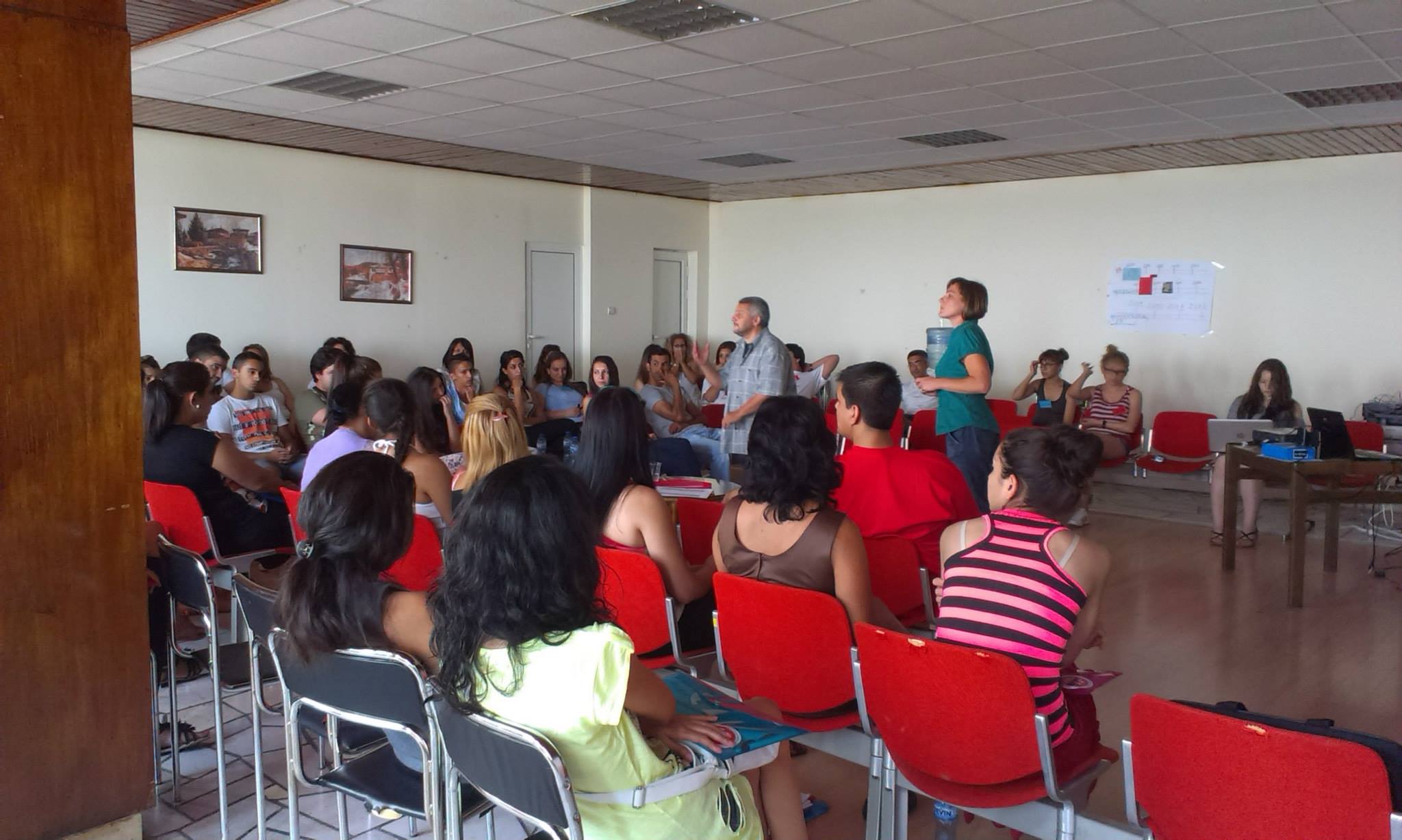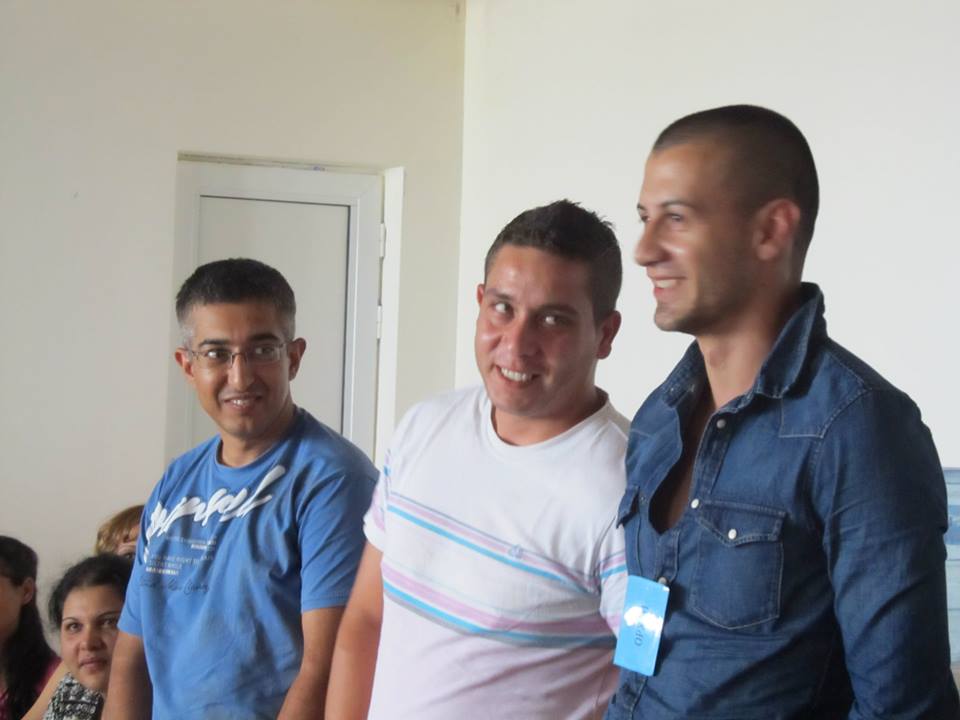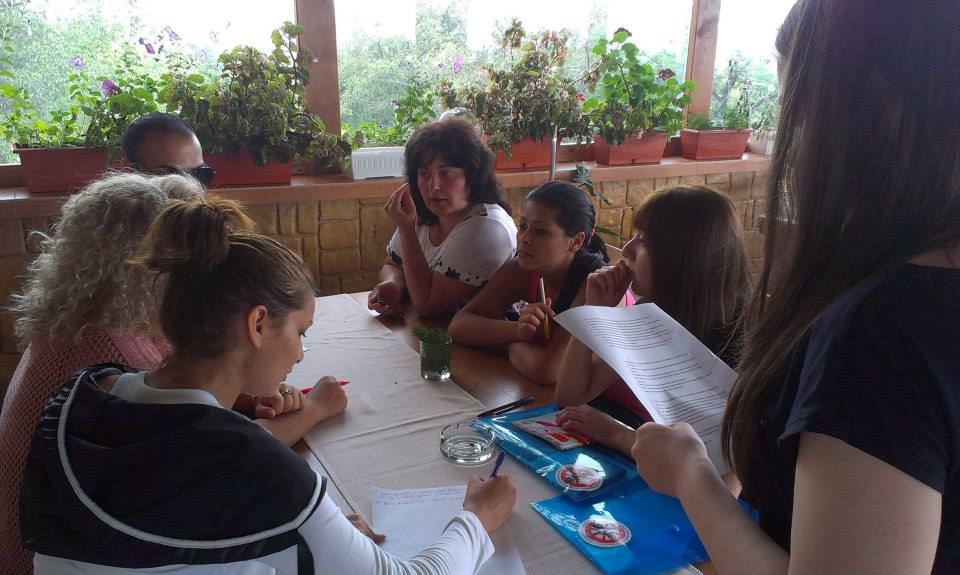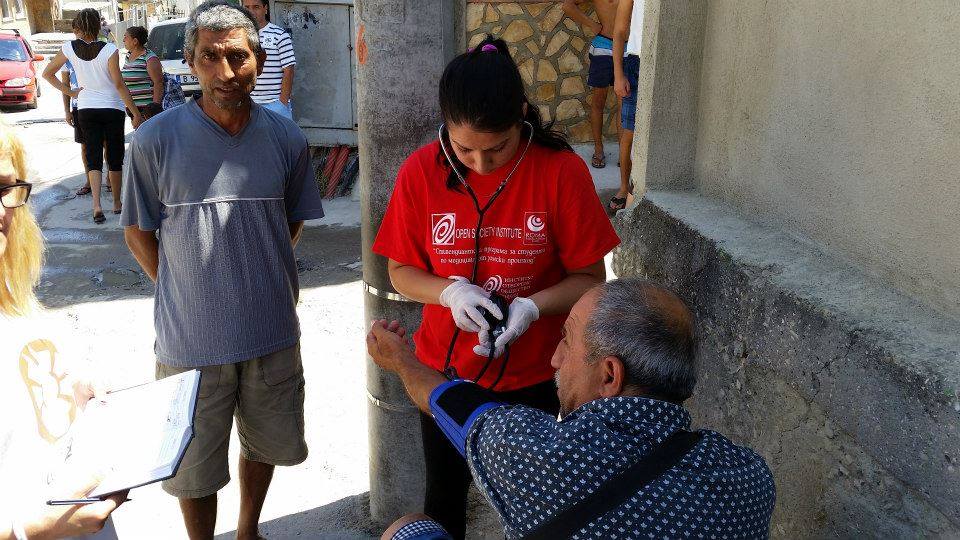05.08.2014More than 70 Roma medical students participated in a summer advocacy camp
 Summer advocacy camp in the sphere of Roma Healthcare gathered more than 70 students of Roma origin who study medicine and medical subjects. The training is organized for 5th consecutive year from Centre for Interethnic Dialog and Tolerance ‘Amalipe’ as part of the Roma Health Scholarship Programme for students in Medical Universities and Colleges. The advocacy camp aimed to strengthen the relationship between these future health workers and the communities for which the access to healthcare is the most difficult. Also, to help the Roma youngsters to overcome their fears, to participate in activities for the development of the Roma community and to turn themselves into role models for the rest of the Roma representatives.
Summer advocacy camp in the sphere of Roma Healthcare gathered more than 70 students of Roma origin who study medicine and medical subjects. The training is organized for 5th consecutive year from Centre for Interethnic Dialog and Tolerance ‘Amalipe’ as part of the Roma Health Scholarship Programme for students in Medical Universities and Colleges. The advocacy camp aimed to strengthen the relationship between these future health workers and the communities for which the access to healthcare is the most difficult. Also, to help the Roma youngsters to overcome their fears, to participate in activities for the development of the Roma community and to turn themselves into role models for the rest of the Roma representatives.
Traditionally, the camp combined theoretical and practical part. It was opened on the 26th July 2014 from representatives of the Open Society Institute – Sofia and Centre ‘Amalipe’. The students remembered the beginning of the programme in 2009 when there were only 23 people in it. All of them were timid, disorientated and unsure both in their and the programme’s success. In 2014, their number has grown three times, they have become confident people who bravely go forward and above to the realization of their dreams. The youngsters drew their dreams about the Roma community, the Roma Health Scholarship Programme and themselves after 1 or 5 years. Their dreams turned out to be unsuspectedly concrete and clear: they dream of working in Bulgaria, in the hospitals together with Roma and non-Roma and their union not to make impression on anyone. They dream of one Roma community awake in which they are an example for respect and imitation without excuses (‘The City Monkey’).
The theoretic part of the camp met the student with representatives of professional medical and patient organizations and other associations. Not only have they discussed the problems in the sphere of the Roma healthcare, but also how could they contribute as future young professionals to the improvement of the health system in Bulgaria. They all also discussed what should the vision of the reform be.
Dr. Stanimir Hasardjiev – President of the National Patient Organization – presented the theme: ‘Reforms in the healthcare and the needs of the patients’. The students consider that the ideal health reform should be solidarity in the insurance which means that all people pay and only the ones who need use. The country has to pay the insurances of the children, the pregnant, the students, the unemployed and the ones with a social pension. There must be control over the income of the NHIF, clarity in the spending of the means and the patients have to receive information about their health rights on a mass scale. Some of the youngsters suggested investors to be found who voluntarily to inject money in the NHIF.
Dr. Dimitar Lenkov – General Secretary of the Bulgarian Medical Union – showed the students the existing strategic documents in the sphere of healthcare by focusing on the National Health Strategy 2014 - 2020. Many of the said questions referred to different problems in the system – First Aid, the professionals abroad, the healthcare in the minorities and others.
Dr. Nedelcho Totev – President of the Association of the municipal hospitals in Bulgaria – discussed with the youngsters what are the problems of the small hospitals and how do the things in the in the regional healthcare stay.
About the health policies and the healthcare of the Roma community with the students talked prof. Ivailo Tarnev – Head of the Neurology Clinic in the Alexandria Hospital and Dr. Radosveta Stamenkova – President of BFPA. The more years go by, the more pessimistic our tone becomes when arguing about the health reform but also more optimistic when talking about the Roma students shared the lectors. The development of these youngsters is remarkable!
The pedagogic doctor and researcher of the Roma culture – Yosef Nunev – talked with the students about their identity. With his pedagogic abilities and Roma sense, he helped a lot of them to free from insight barriers and to share what is for them the Roma identity, how did their parents save it and how do they save it now. There is a difference between origin and identity. The origin not always leads to identity while our aim is you to have a Roma identity, explained Dr. Nunev. His session was continued by Deyan Kolev who made the role of the Roma students in the process of forming a modern identity clear: to stop the assimilation among young and educated; to overcome the patriarchic habits which limit the identical expression, but save the relationships with the community; to form identity which includes originality of groups such as Millet, Rudari and other.
 ‘What has been the participation of the Roma in the historical processes’, explained the historian from UVT – Prof. Milko Palangurski – who made the future health workers familiar with historical facts about the Roma on our land. The Roma participated in the wars and all historical processes together with the Bulgarians, too, concluded the participants. Prof. Palangurski emphasized that the driving force in the modern history is the fight for better education and called up the Roma medical students on making the change in the Roma community which the Bulgarian teachers and monks made during the Renaissance – to waken the search of the new.
‘What has been the participation of the Roma in the historical processes’, explained the historian from UVT – Prof. Milko Palangurski – who made the future health workers familiar with historical facts about the Roma on our land. The Roma participated in the wars and all historical processes together with the Bulgarians, too, concluded the participants. Prof. Palangurski emphasized that the driving force in the modern history is the fight for better education and called up the Roma medical students on making the change in the Roma community which the Bulgarian teachers and monks made during the Renaissance – to waken the search of the new.
The theme was continued by Teodora Krumova who showed the students the different historical sources including a piece of information in one way or another. She gave concrete examples how can unsuspected facts for the local Roma be extracted from class books and books for learning students which are thick with dust in the schools. They agreed to continue the gathering of information on places and on the 8th April, the International Roma Day, to present an exploitation of data for the beginning of the enlightenment in the Roma community in the separate regions of Bulgaria.
Deyan Kolev showed the Roma student what is the advocacy in the sphere of healthcare and what advocacy activities can be undertaken to improve the access to healthcare and to fight against some existing negative practices which are an object of advocacy integration. This leads to lively discussion: what does ‘integration’ mean; does it happen; what prevents it from happening; what can our role in the process be…
 Important part in the work of the advocators for better healthcare in the vulnerable groups is the ability to solve conflicts and the mediators while different conflict situations. Simeon Todorov and Eleonora Todorova presented the theme and exercises for teamwork. Many of the problems in the access to healthcare do not refer to money or medical activities, but to the organization of the system. In the most cases, the frustration of the patients is due to the bad communication with the health specialists or to the lack of dialog. These are things which can be changed in an early stage before the health workers to become part of the system and for this reason to be a mediator is an important skill.
Important part in the work of the advocators for better healthcare in the vulnerable groups is the ability to solve conflicts and the mediators while different conflict situations. Simeon Todorov and Eleonora Todorova presented the theme and exercises for teamwork. Many of the problems in the access to healthcare do not refer to money or medical activities, but to the organization of the system. In the most cases, the frustration of the patients is due to the bad communication with the health specialists or to the lack of dialog. These are things which can be changed in an early stage before the health workers to become part of the system and for this reason to be a mediator is an important skill.
After the interesting days of theoretical lessons, filled with positive emotions and will, the students went on to the specially organized for them fieldwork: in the ‘Asparuhovo’ quarter, Varna; the city of Nikolaevo and Gorna Oriahovica.
More pictures from the training seе here.
 Summer advocacy camp in the sphere of Roma Healthcare gathered more than 70 students of Roma origin who study medicine and medical subjects. The training is organized for 5th consecutive year from Centre for Interethnic Dialog and Tolerance ‘Amalipe’ as part of the Roma Health Scholarship Programme for students in Medical Universities and Colleges. The advocacy camp aimed to strengthen the relationship between these future health workers and the communities for which the access to healthcare is the most difficult. Also, to help the Roma youngsters to overcome their fears, to participate in activities for the development of the Roma community and to turn themselves into role models for the rest of the Roma representatives.
Summer advocacy camp in the sphere of Roma Healthcare gathered more than 70 students of Roma origin who study medicine and medical subjects. The training is organized for 5th consecutive year from Centre for Interethnic Dialog and Tolerance ‘Amalipe’ as part of the Roma Health Scholarship Programme for students in Medical Universities and Colleges. The advocacy camp aimed to strengthen the relationship between these future health workers and the communities for which the access to healthcare is the most difficult. Also, to help the Roma youngsters to overcome their fears, to participate in activities for the development of the Roma community and to turn themselves into role models for the rest of the Roma representatives.
Traditionally, the camp combined theoretical and practical part. It was opened on the 26th July 2014 from representatives of the Open Society Institute – Sofia and Centre ‘Amalipe’. The students remembered the beginning of the programme in 2009 when there were only 23 people in it. All of them were timid, disorientated and unsure both in their and the programme’s success. In 2014, their number has grown three times, they have become confident people who bravely go forward and above to the realization of their dreams. The youngsters drew their dreams about the Roma community, the Roma Health Scholarship Programme and themselves after 1 or 5 years. Their dreams turned out to be unsuspectedly concrete and clear: they dream of working in Bulgaria, in the hospitals together with Roma and non-Roma and their union not to make impression on anyone. They dream of one Roma community awake in which they are an example for respect and imitation without excuses (‘The City Monkey’).
The theoretic part of the camp met the student with representatives of professional medical and patient organizations and other associations. Not only have they discussed the problems in the sphere of the Roma healthcare, but also how could they contribute as future young professionals to the improvement of the health system in Bulgaria. They all also discussed what should the vision of the reform be.
Dr. Stanimir Hasardjiev – President of the National Patient Organization – presented the theme: ‘Reforms in the healthcare and the needs of the patients’. The students consider that the ideal health reform should be solidarity in the insurance which means that all people pay and only the ones who need use. The country has to pay the insurances of the children, the pregnant, the students, the unemployed and the ones with a social pension. There must be control over the income of the NHIF, clarity in the spending of the means and the patients have to receive information about their health rights on a mass scale. Some of the youngsters suggested investors to be found who voluntarily to inject money in the NHIF.
Dr. Dimitar Lenkov – General Secretary of the Bulgarian Medical Union – showed the students the existing strategic documents in the sphere of healthcare by focusing on the National Health Strategy 2014 - 2020. Many of the said questions referred to different problems in the system – First Aid, the professionals abroad, the healthcare in the minorities and others.
Dr. Nedelcho Totev – President of the Association of the municipal hospitals in Bulgaria – discussed with the youngsters what are the problems of the small hospitals and how do the things in the in the regional healthcare stay.
About the health policies and the healthcare of the Roma community with the students talked prof. Ivailo Tarnev – Head of the Neurology Clinic in the Alexandria Hospital and Dr. Radosveta Stamenkova – President of BFPA. The more years go by, the more pessimistic our tone becomes when arguing about the health reform but also more optimistic when talking about the Roma students shared the lectors. The development of these youngsters is remarkable!
The pedagogic doctor and researcher of the Roma culture – Yosef Nunev – talked with the students about their identity. With his pedagogic abilities and Roma sense, he helped a lot of them to free from insight barriers and to share what is for them the Roma identity, how did their parents save it and how do they save it now. There is a difference between origin and identity. The origin not always leads to identity while our aim is you to have a Roma identity, explained Dr. Nunev. His session was continued by Deyan Kolev who made the role of the Roma students in the process of forming a modern identity clear: to stop the assimilation among young and educated; to overcome the patriarchic habits which limit the identical expression, but save the relationships with the community; to form identity which includes originality of groups such as Millet, Rudari and other.
 ‘What has been the participation of the Roma in the historical processes’, explained the historian from UVT – Prof. Milko Palangurski – who made the future health workers familiar with historical facts about the Roma on our land. The Roma participated in the wars and all historical processes together with the Bulgarians, too, concluded the participants. Prof. Palangurski emphasized that the driving force in the modern history is the fight for better education and called up the Roma medical students on making the change in the Roma community which the Bulgarian teachers and monks made during the Renaissance – to waken the search of the new.
‘What has been the participation of the Roma in the historical processes’, explained the historian from UVT – Prof. Milko Palangurski – who made the future health workers familiar with historical facts about the Roma on our land. The Roma participated in the wars and all historical processes together with the Bulgarians, too, concluded the participants. Prof. Palangurski emphasized that the driving force in the modern history is the fight for better education and called up the Roma medical students on making the change in the Roma community which the Bulgarian teachers and monks made during the Renaissance – to waken the search of the new.
The theme was continued by Teodora Krumova who showed the students the different historical sources including a piece of information in one way or another. She gave concrete examples how can unsuspected facts for the local Roma be extracted from class books and books for learning students which are thick with dust in the schools. They agreed to continue the gathering of information on places and on the 8th April, the International Roma Day, to present an exploitation of data for the beginning of the enlightenment in the Roma community in the separate regions of Bulgaria.
Deyan Kolev showed the Roma student what is the advocacy in the sphere of healthcare and what advocacy activities can be undertaken to improve the access to healthcare and to fight against some existing negative practices which are an object of advocacy integration. This leads to lively discussion: what does ‘integration’ mean; does it happen; what prevents it from happening; what can our role in the process be…
 Important part in the work of the advocators for better healthcare in the vulnerable groups is the ability to solve conflicts and the mediators while different conflict situations. Simeon Todorov and Eleonora Todorova presented the theme and exercises for teamwork. Many of the problems in the access to healthcare do not refer to money or medical activities, but to the organization of the system. In the most cases, the frustration of the patients is due to the bad communication with the health specialists or to the lack of dialog. These are things which can be changed in an early stage before the health workers to become part of the system and for this reason to be a mediator is an important skill.
Important part in the work of the advocators for better healthcare in the vulnerable groups is the ability to solve conflicts and the mediators while different conflict situations. Simeon Todorov and Eleonora Todorova presented the theme and exercises for teamwork. Many of the problems in the access to healthcare do not refer to money or medical activities, but to the organization of the system. In the most cases, the frustration of the patients is due to the bad communication with the health specialists or to the lack of dialog. These are things which can be changed in an early stage before the health workers to become part of the system and for this reason to be a mediator is an important skill.
After the interesting days of theoretical lessons, filled with positive emotions and will, the students went on to the specially organized for them fieldwork: in the ‘Asparuhovo’ quarter, Varna; the city of Nikolaevo and Gorna Oriahovica.
More pictures from the training seе here.








